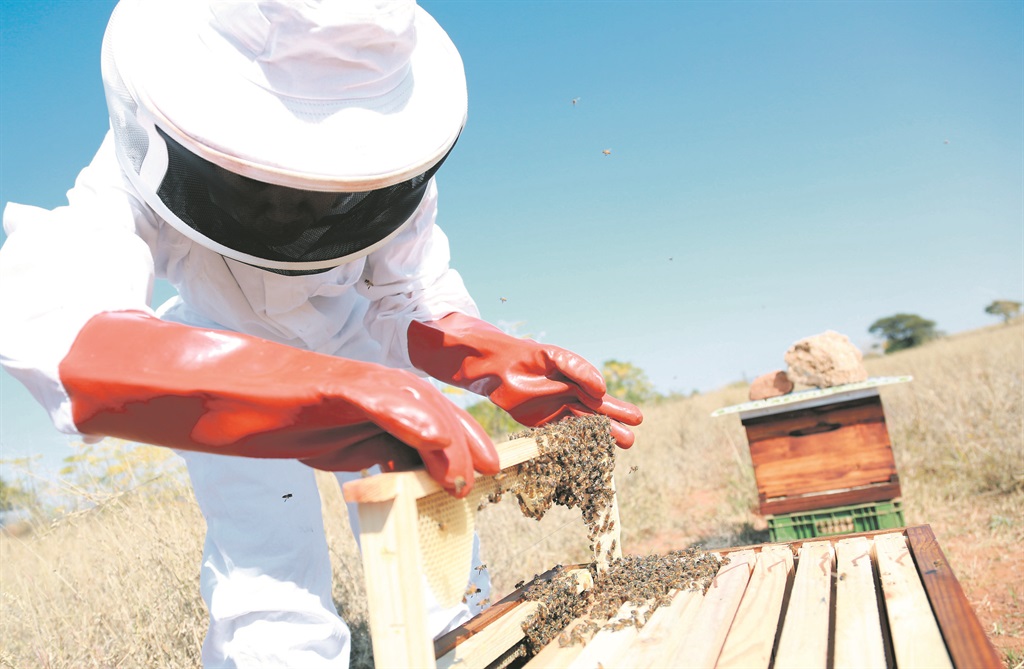
This feature is part of a journalism partnership called Our Land between City Press, Rapport, Landbouweekblad and Code for Africa to find the untold stories, air the debates, amplify the muted voices, do the research and, along the way, find equitable solutions to SA’s all-important land issue.
Anna Trapido finds generations of beekeeping in local artisanal honey producer Native Nosi’s story
All varieties of honey are the end result of a plant-insect-human symbiotic relationship that sees bees collecting the nectar that builds up at the base of flowers and, in the process, picking up pollen, which they then transfer to the next bloom they visit.
A bee will sparingly siphon off sufficient fuel from its nectar stomach to sustain its mission, but most of the load is saved for subsequent honey production.
Bees transform nectar into honey through a series of regurgitation, enzymatic and concentration processes, which split complex sucrose into simple sugars that are then deposited into the hexagonal wax cells of honeycomb storage vessels.
Some of these cells are wombs for bee larvae and others are food stores for adult bees to feed on in winter when fresh nectar food sources are scarce.
Humans have harvested honey for thousands of years. The honey is then drained and strained from the honeycomb and placed into jars.
We should all get stuck into honey – not only does it taste terrific, but it is also potentially packed with medicinally useful micronutrients.
Scientists are increasingly recognising honey’s prodigious antibacterial, antifungal and antioxidant properties.
Within African traditional medicine, honey has been used since time immemorial for its physical healing abilities, as well as for its symbolic and spiritual significance.
However, not all honey runs rich with the aforementioned therapeutic properties.
Approximately 60% of the honey on South African supermarket shelves is imported and irradiated to a point where nutritional benefits are negligible.
The lower prices of imported offerings relative to South African honeys are often achieved by diluting the product with rice and corn syrup.
This is why Mokgadi Mabela and her multiaward-winning local honey brand Native Nosi is such a sweet addition to this sticky situation.
Mokgadi, a third-generation beekeeper, harvests and sells pure, raw honey from environmentally sustainable hives placed on farms and in rural communities across Gauteng, Mpumalanga and Limpopo.
Last year, she sold almost two tons of honey – most of it via her online shop.
She attributes her success to the fact that “customers increasingly want to know where their food comes from and how it has been produced”.
“I place the hives, inspect the hives and harvest the honey. I can guarantee that my honey hasn’t been tampered with and our bees were not fed artificial nutrients. I can tell you exactly where the honey in every pot I produce comes from, as well as the conditions in that particular place.”
When it comes to honey, local really is lekker.
Mokgadi explains that “the closer the honey was produced to the location of your specific home, the more antibodies that pertain to your specific circumstances it will contain. The bees will have fed on the flowers in your environment and those are the ones from which the pollen allergens that affect you come.”
Native Nosi honey is not only healthy, it is also delicious and diverse.
If you read the label on the more ubiquitous honey brands, you will see that they generally contain an anonymous mix of honeys from various countries, which are blended to give a “consistent” – some might say blandly sweet – taste.
Each of Mokgadi’s honeys has unique characteristics that can be attributed to the land and crops amid which it was made.
The flavour, colour, aroma and texture of honey are largely determined by the bee’s nectar source and the climatic conditions.
Hotter regions offer more concentrated tastes and textures. Bees harvesting sunflower nectar make pale, supersweet honey, while those working with avocado and macadamia trees offer up deep, dark, molasses-coloured honey with a rich, buttery but not overly sweet taste.
Those living close to litchi orchards offer perfumed, fruity flavours.
Just as the honey reflects the context from whence it comes, so does the beekeeper.
Mokgadi says “Nosi is the Sotho word for honey bee. To me, Native Nosi represents pure, natural unadulterated honey products produced locally and in harmony, and it also represents continuity with my past and present. My grandfather and my father were beekeepers before me, and I hope that Native Nosi reflects a respect for their skills and wisdom, and reveals a love connection in everything we do.
“Historically, bees have been associated with ancestral communication and, in my case, that connection is very direct. I hope my grandfather would be pleased that, even though I didn’t meet him, he was sowing the seed for what I do. Generations along the line, he would recognise my passion and commitment. I only know my grandfather through the stories that others tell, but all of those show him to be a man worthy of respect. It pleases me to honour that image. I want to respect his legacy. I want to make him proud.”
Grandpa Mabela must surely be proud because, whether you want the gloriously light, intensely savoury amber essence of thyme honey or the smoky, malty intensity of boekenhout honey, Native Nosi is the bee’s knees.
For more information and to order, go to nativenosi.co.za or email info@nativenosi.co.za




 Publications
Publications
 Partners
Partners








